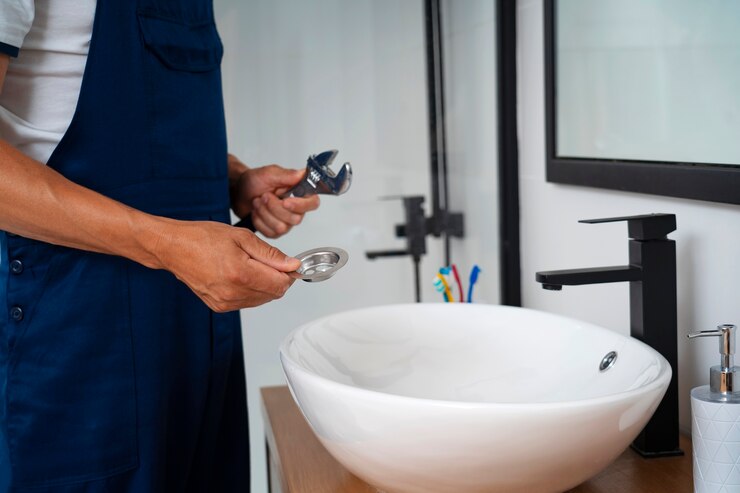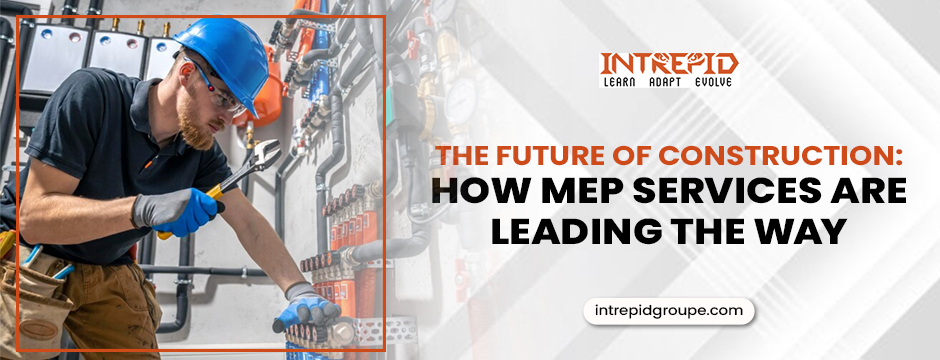The United Arab Emirates (UAE) is recognized globally for its groundbreaking architectural marvels and infrastructural advancements. From the iconic Burj Khalifa to innovative developments in smart cities, the UAE’s construction sector is one of the most dynamic in the world. This rapid growth is fueled by the country’s relentless pursuit of sustainability, energy efficiency, and modernization. Among the key players in this transformation are Mechanical, Electrical, and Plumbing (MEP) services.
In this blog, we will explore how MEP services are shaping the future of construction in the UAE, driving the industry towards greater sustainability, efficiency, and innovation. Moreover, we will delve into how these services interact with other essential construction services, such as civil services for construction, to create efficient, sustainable buildings.
Understanding MEP Services and Their Importance
Before we examine the pivotal role of MEP services in shaping the future of construction, it’s essential to understand what MEP stands for and why these systems are so important.
Mechanical Systems: These systems include heating, ventilation, and air conditioning (HVAC), which are responsible for regulating temperature and air quality within a building. An optimized HVAC system is crucial for maintaining energy efficiency, especially in the UAE’s hot climate.
Electrical Systems: Electrical systems provide power distribution, lighting, and other essential electrical services. They are also responsible for the integration of advanced technologies such as smart building systems, automation, and energy management.
Plumbing Systems: Plumbing services are responsible for the water supply, drainage, and waste management within a building. This includes water conservation methods, sewage systems, and rainwater harvesting, all of which are integral to the sustainability of a building.
In modern construction, MEP systems are interdependent. The integration of mechanical, electrical, and plumbing systems ensures the functionality and sustainability of a building. When done correctly, these services lead to efficient buildings maintenance that are more energy-efficient, cost-effective, and environmentally friendly.
How MEP Services Are Shaping the Future of Construction in the UAE
Energy Efficiency and Sustainability
The UAE is making strides in reducing its carbon footprint, especially in the construction sector. Buildings account for a significant portion of energy consumption, and as such, energy efficiency has become a top priority. MEP services are essential in achieving this goal.
For example, energy-efficient HVAC systems are designed to regulate temperature without consuming excessive energy. These systems can be equipped with smart technology that automatically adjusts based on the building’s occupancy and weather conditions. Additionally, energy-efficient lighting systems, such as LED lights, can reduce a building’s electricity consumption.
Water conservation is another critical focus. In a country where water is a scarce resource, MEP services that implement advanced plumbing systems such as rainwater harvesting, greywater recycling, and low-flow fixtures can significantly reduce water wastage. These measures not only benefit the environment but also contribute to a building’s long-term cost savings.
Building Performance and Occupant Comfort
One of the primary goals of MEP services is to enhance building performance and occupant comfort. Properly designed mechanical systems ensure optimal indoor air quality and climate control, which are essential for occupant health and productivity. In a place like the UAE, where the climate can be harsh, having an efficient HVAC system that regulates temperature and humidity is key to ensuring comfort.
Electrical systems that offer flexible lighting and power control options allow occupants to personalize their environment. Additionally, integrating lighting systems that adjust according to natural daylight levels can reduce the need for artificial lighting, further contributing to energy savings.
By optimizing these systems, MEP services help create buildings that not only perform better but also provide a higher level of comfort and satisfaction for occupants.
Smart Building Technologies
The future of construction is undeniably intertwined with technology, and MEP services are a critical enabler of smart building technologies. Smart buildings use sensors and automation to monitor and control various systems such as lighting, HVAC, security, and even energy usage.
MEP services, including electrical and mechanical systems, integrate seamlessly with these smart technologies, allowing for real-time data collection and analysis. This leads to more efficient building operations, cost savings, and a better user experience.
For example, advanced HVAC systems can automatically adjust temperatures based on occupancy, while lighting systems can turn off when rooms are unoccupied. This level of automation not only makes buildings more comfortable but also helps reduce operational costs.
Sustainability and Green Building Certifications
The UAE has made significant progress in green building initiatives. The country has introduced regulations such as the Estidama program and the LEED certification, which aim to ensure that buildings are designed and built sustainably. MEP services are instrumental in meeting these green building standards.
By using energy-efficient HVAC systems, renewable energy sources, and sustainable plumbing solutions, MEP services can help buildings achieve these certifications. In addition, implementing sustainable MEP systems can enhance a building’s marketability, making it more attractive to tenants and buyers who prioritize environmental sustainability.
The Role of Civil Services for Construction in MEP Integration

In addition to MEP services, civil construction services play a crucial role in ensuring that these systems are integrated effectively into a building’s structure. Civil construction services include the planning and execution of the foundation, structural framework, and exterior elements of a building.
The seamless coordination between MEP services and civil services for construction is crucial for achieving optimal performance and sustainability. For instance, civil engineers ensure that the building’s structure can accommodate the MEP systems, while MEP engineers design the systems to work efficiently within the constraints of the building’s design.
This collaboration ensures that the building’s infrastructure is not only strong and durable but also capable of supporting advanced MEP technologies that drive efficiency and sustainability.
Technological Advancements in MEP Services
The UAE is a leader in adopting cutting-edge technology in the construction sector. With advancements in 3D modeling, Building Information Modeling (BIM), and prefabrication, the future of MEP services looks even more promising.
BIM, for example, allows MEP engineers to design and plan the mechanical, electrical, and plumbing systems in a 3D model before the construction process begins. This helps identify potential issues early in the process, reducing errors and delays during construction.
Moreover, the rise of Internet of Things (IoT) devices and artificial intelligence (AI) in MEP systems will further enhance the capabilities of buildings. AI can predict and optimize energy usage, while IoT devices can provide real-time data on system performance, allowing for predictive maintenance and ensuring that systems run efficiently throughout their lifecycle.
The Challenges and Opportunities of MEP Services in the UAE
Despite the significant advantages of MEP services, the implementation of these systems can be challenging. The complexity of modern MEP systems requires skilled professionals, and coordinating these systems with other aspects of construction, such as civil services for construction, requires careful planning and collaboration.
Additionally, as the construction industry evolves, there is a need for continuous innovation and adaptation. The pace of technological advancements means that MEP engineers must remain up-to-date with the latest trends and practices to ensure that systems are future-proof and adaptable.
However, these challenges present numerous growth opportunities. The demand for sustainable buildings and smart technologies will continue to drive innovation in MEP services. As the UAE continues to invest in construction and infrastructure development, the role of MEP services will only become more significant, creating ample opportunities for professionals in this field.
The Future Outlook: MEP Services in the UAE Construction Sector with Intrepid
As the UAE continues to push boundaries in construction and infrastructure development, Intrepid is at the forefront, offering cutting-edge MEP services that are integral to shaping the future of the built environment. With the country’s commitment to sustainability, innovation, and energy efficiency, Intrepid’s advanced MEP solutions are driving the demand for sophisticated systems across residential, commercial, and industrial buildings.
As smart cities and sustainable developments become increasingly common, Intrepid is leading the way in integrating state-of-the-art technologies and sustainable solutions. Through seamless collaboration with civil services for construction and other stakeholders, Intrepid ensures that future buildings are not only functional but also environmentally responsible, energy-efficient, and comfortable for all occupants. With Intrepid, the future of construction in the UAE is efficient, sustainable, and technologically advanced.
Final Thoughts
MEP services are playing a pivotal role in the future of construction in the UAE. With an increasing focus on sustainability, energy efficiency, and smart technologies, these services are reshaping the way buildings are designed, constructed, and operated. By improving energy performance, enhancing occupant comfort, and supporting the development of smart buildings, MEP services are ensuring that the UAE remains at the forefront of global construction innovation.
The integration of MEP systems with civil construction services is key to achieving successful outcomes, ensuring that buildings are both structurally sound and capable of supporting the advanced technologies of the future. As the UAE continues to build its future, MEP services will remain essential in creating buildings that are not only functional but also sustainable, efficient, and aligned with the needs of a rapidly evolving society. Partner with Intrepid today for innovative, sustainable, and energy-efficient solutions that will shape the future of your building. Contact us now to learn more about how we can help you build smarter, greener, and more efficient spaces. Let’s build the future together!

















Leave a Reply